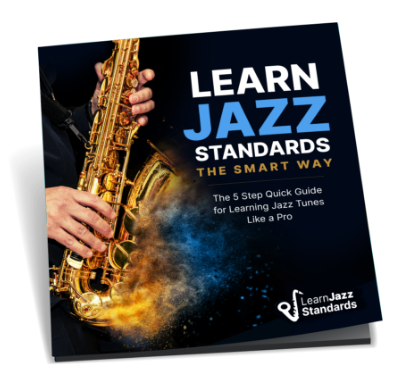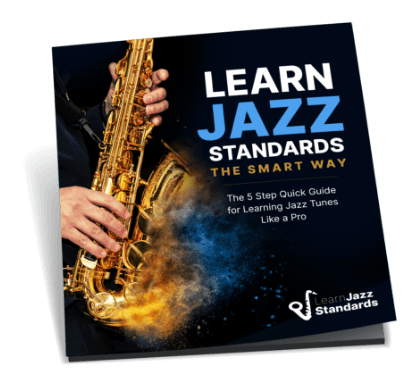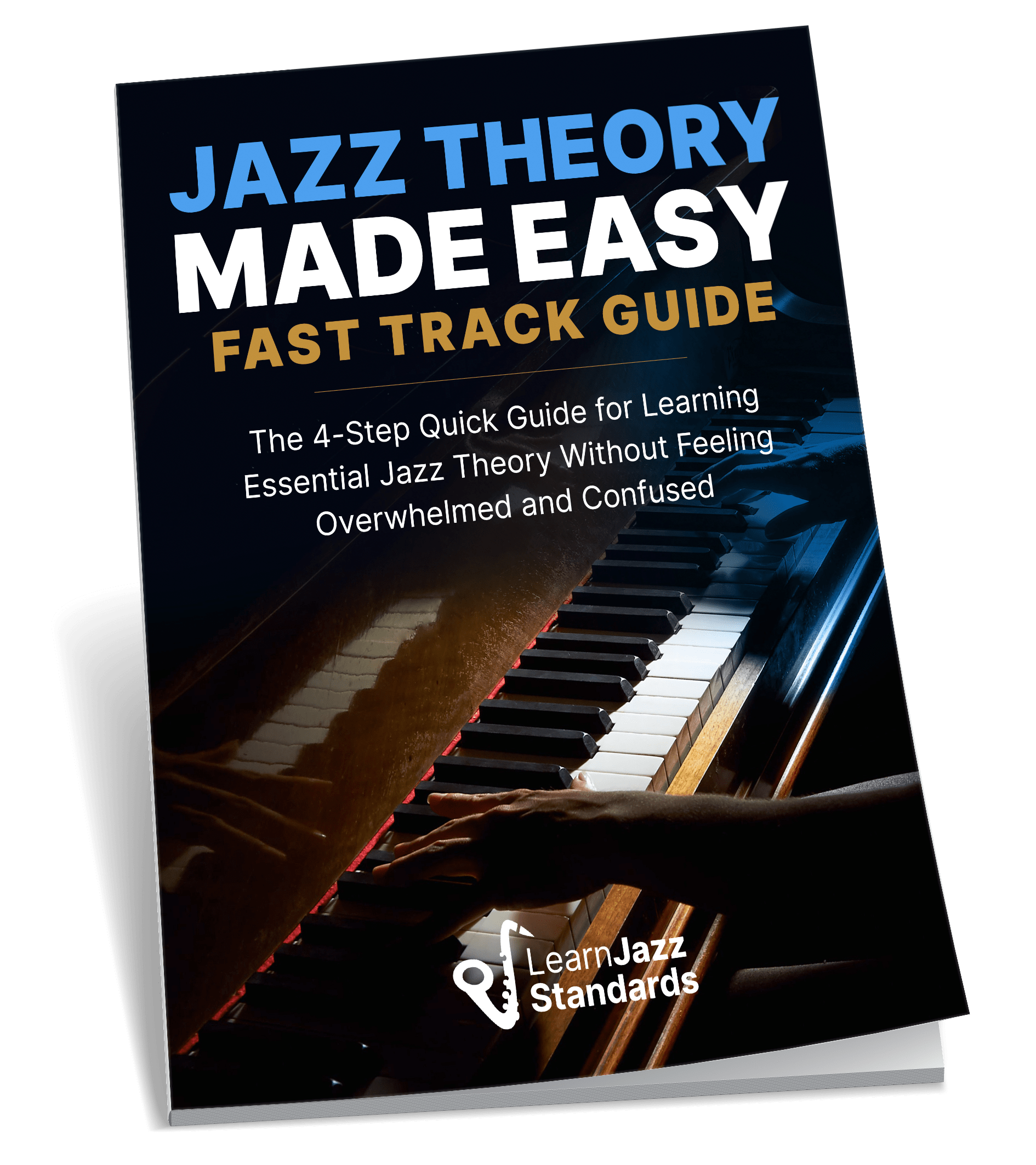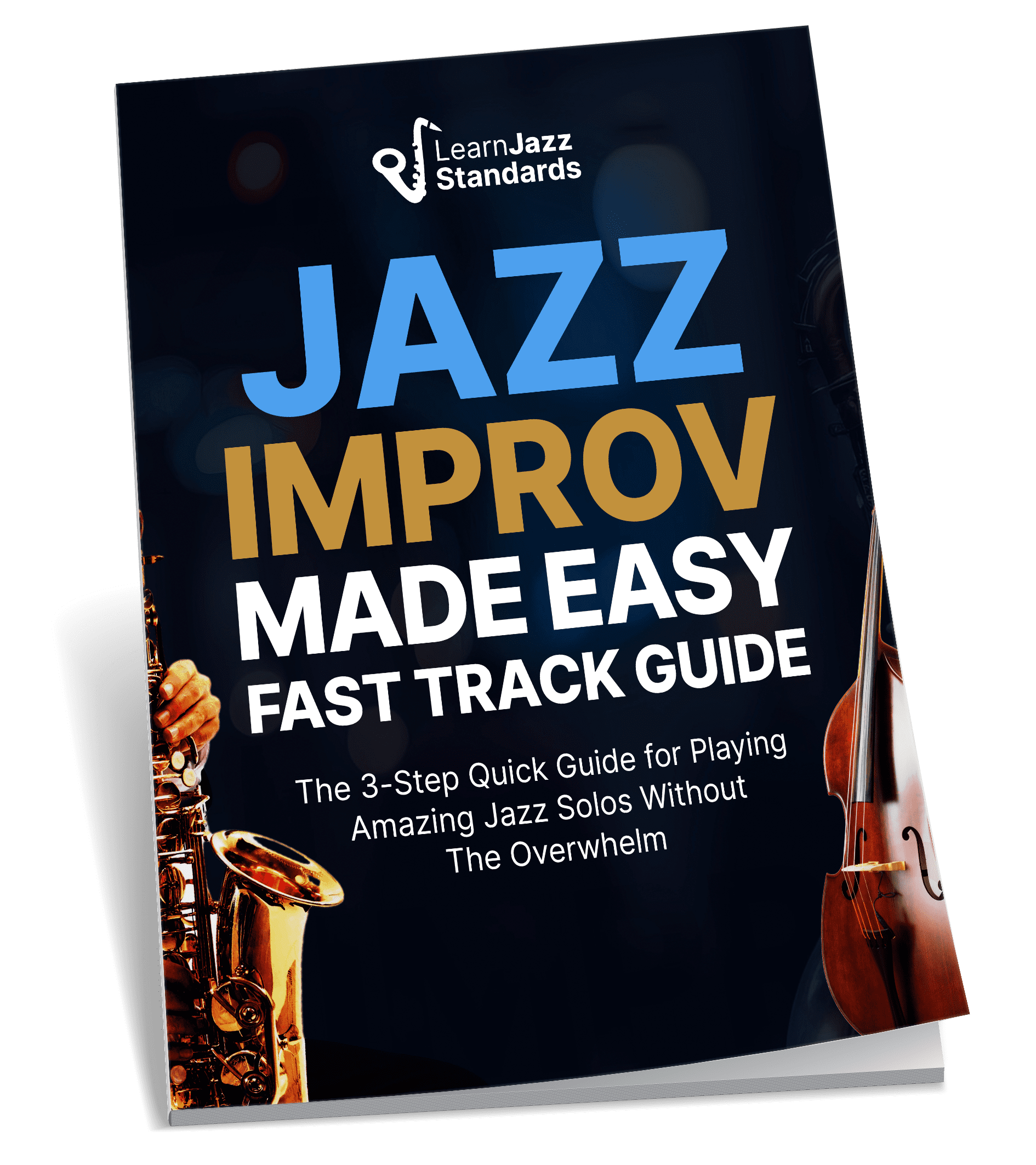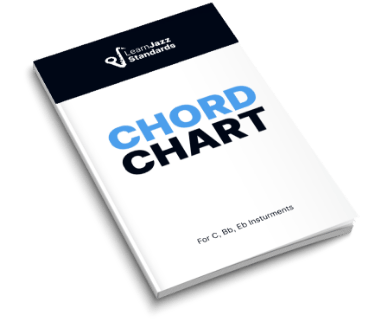Welcome to episode 113 of the LJS Podcast where today we are talking all about jazz play-alongs and how they could be hurting your jazz playing. Backing tracks can be great tools, but if used in the wrong way they could instill some bad habits. Learn when and how to use them, and when to leave them be. Listen in!
Listen to episode 113
When Learn Jazz Standards first started it wasn’t quite the same as it is now. Back then it was mostly just a resource for learning jazz standards, hence the name. We didn’t have the jazz lessons, tutorials, the podcast, and the overall focus we have now.
Part of the resources we offered (and still do) were backing tracks for jazz standards. Our thought was they would aid our subscribers, especially those who don’t have as much access to playing with other musicians.
What we didn’t expect is that they would be such a hit. Our YouTube channel really blew up and became quite popular, mainly because of the play-alongs.
That’s why this week’s episode is especially important. It is my responsibility to make sure you know when play-alongs are good to use and when they could be detrimental.
In the right hands, they are a great tool to supplement your practice. In the wrong hands, they are a crutch used to learn and play jazz repertoire.
Here’s some of what I talk about in this episode:
1. Three reasons practicing with play-alongs can be detrimental.
2. Three situations you should not use play-alongs in your practice.
3. Three situations you should or could use play-alongs in your practice.
Play-alongs should not be discarded altogether. They can, in fact, be great tools. Just heed some of this advice and you’ll be on the right track!
Important Links
Band-in-a-Box[vc_separator]
Free Guide to learn standards by ear: Learn Jazz Standards the Smart Way
Read the Transcript
Brent: Hey, hey, what’s up everybody, my name’s Brent, I am the jazz musician behind the website LearnJazzStandards.com, which is a blog and a podcast all geared toward helping you become a better jazz musician. I want to thank you so much for being here, welcome, if it’s your first time ever listening, or if you’re a regular listener, I really do appreciate it, I’m so excited to serve you today. And, oh, man, guys, I’ve got a serious head cold going on today, so I apologize for my voice, I’m not sure if it’s coming through on the mic. I had to cancel my gig last night because, well I didn’t cancel, I found a sub because I was just, oh, I’m not feeling well. It’s gonna get so much worse if I go out, so that sucked.
I’m having a sucky week, but you know what, things could always be worse. So, I’m thankful for everything and hopefully I’ll feel better soon, but the show must go on, right? The show’s gotta keep going on, so I’m here to deliver this podcast episode to you, for what I think is a great important topic for today’s episode, 113. Which is all about how play-alongs, backing tracks, could be damaging or hurting your jazz playing.
Now, I know that if you’re listening to this podcast and you’re familiar with LearnJazzStandards.com, what we do, you know that we have a YouTube channel that has hundreds of jazz play-alongs and backing tracks on them. And you’re probably thinking right now, well, Brett, what are you talking about? Don’t you have a lot of jazz standard play-alongs out there, and all this stuff. Why are you telling me that maybe I shouldn’t be doing it?
I know that sounds kind of weird, but I think it’s even more important because that platform accidentally, by the way, blew up, that I do hone in on what the purpose of using jazz play-alongs for practicing are, when they should be used, and when they shouldn’t be used. I think that’s a really important for me to hone in on with all of you guys, because I do think there is a time and place for them, I would never say that they are bad, and if you go around looking online, you’ll see a lot of notable jazz musicians or jazz educators coming to the same conclusion, saying that they’re not bad, but they can be used in the wrong way.
Then again, there’s also others that totally would disagree. So it’s a little bit on an opinionated episode, but bear with me, and let’s unpack this together.
But before we do that, I just want to say, I haven’t said in a while, or earlier on in this month we came out with the brand new eBook and companion course, the Jazz Standards playbook, which it’s exploding.
And I’m just so excited because so many people are getting their hands on this eBook and getting it to this companion course, and I’m just already hearing stories about how it’s completely transforming their understanding and really playing in general, and that really excites me, makes all the work that I did so worth it, so thanks to everybody who’s just taken part in that. And if you had not gotten that ebook or joined that companion course yet, go to the Jazz Standards Playbook.com, you can check it out there. The Jazz Standards Playbook.com.
Okay, that’s all for that. Let’s jump into today’s show.
So as I was mentioning earlier, on Learn Jazz Standards a long time ago, in the early days of Learn Jazz Standards’ existence, the website, we decided in the original website, by the way, in case you’re not familiar, if you haven’t been following with us from the very beginning, or you plopped in somewhere in the middle, or maybe you’re brand-new, the website was a lot different than it is now. It used to be really the only thing that was really there was it was just a resource for learning Jazz Standards, hence why it’s called Learn Jazz Standards.com, it was just a place for if you wanted to learn a particular tone, our goal was to try to just have a resource for an all-encompassing resource for that.
So it still exists today, it’s still an important part of the website, but it’s by no means the main focus. There was a bio, there’s a tune so you could understand what it was all about, there was popular recordings for it, there’s chord charts so that people can cross-reference hearing them by ear and then trying to figure them out, and all the resources you need, and then we decided to start making backing tracks because we thought, well, hey that’d be a great resource to add, especially for people that just don’t have access to playing with other musicians.
So, we started building these backing tracks on a really cool piece of software, which I still love today, and I still promote it, which is Band in a Box, Band in A Box, basically it’s a software, you can use the real samples of musicians who are having been studio recorded, and then their software algorithms put it together whenever you type in chord changes into the software. It’s really cool.
Anyways, we started just making them because that was cheap, easy, a way for us to serve our audience better, we put them up onto YouTube, and embedded them onto our website. Well, it was a complete accident, it wasn’t supposed to be a very important part of the website, what we were trying to do. But that YouTube channel just started growing like crazy because apparently people love jazz play-alongs. And if you’re listening, I guarantee you there are a lot of people listening today that have used those horrible looking videos that look like they’re from the ancient times of the internet, with our first original logo and it’s this green background, it’s horrible, but they are there forever now.
But, yeah, we got like, today I think we have 85,000 subscribers on YouTube mostly because of that. Now we come out with jazz tutorial videos every single week. We also post the podcasts on YouTube, so if you’re not subscribed to YouTube, definitely check that out, because we are serving up a lot more than just that these days. That’s YouTube.com forward slash Learn Jazz Standards.
All this long story, all this talking, these shenanigans right now to say that we have inadvertently become a platform that is known for its play-alongs. Okay. And that was not intended to happen. They were intended to be a tool that our subscribers were using, just to help everything else that we were giving. So it’s great, I’m really happy that so many people are using those, that they’re getting a lot of help out of these play-alongs, but I think, like I said earlier, that’s why it’s especially important for me to talk about when it could actually be a detriment to use these play-alongs.
So, when you should be using them, and when you shouldn’t be using them, because they are simply a tool that you can use, they are not something that you should use as a crutch, more on that in second. But I think the first think, and I know this is kind of a little bit of a negative episode, so I usually do very positive episodes, I’m not, by the way if you’ve been listening to me for a while, I am the opposite of a jazz snob, I’m not one of those people that say, you can’t use technology, you can’t do things this way or that way, you have to do it this way. I’m totally not that guy at all.
But I do think there is a time and a place for these play-alongs, so I think, let’s start with some of the negative stuff here. We’ll get to the positive, don’t worry. But, let me go over three pitfalls that I think can occur when using play-alongs. Things that play-alongs just can’t quite do and could possibly train you in the wrong way.
So number one is there’s no interaction when you have a play-along. Jazz is all about interaction. Interacting, if you’re a soloist, you’re interacting with the rhythm section, if you’re a rhythm section you’re interacting with the soloist, that’s what jazz music is all about. It’s improvised music, it’s art music, and so it’s all about that spirit, but when you have a play-along and you’re practicing with a play-along, that just simplify can’t happen.
Whether it’s Jamie Abersaw play-alongs, which are recorded with professional musicians, or are Learn Jazz Standards play-alongs, which are also professional musicians, but it’s even more static than that because they are programmed. It’s real professional musicians, but they’re programmed together, it sounds very real, but you know, they’re not actually playing live.
So there’s no interaction, so no one can feed off of you, you can’t feed off of them. And then some of the Jamie Abersaw recordings, they are in fact responding to an actual soloist, I could be wrong but I think when he had those recorded, there was a soloist recording and the rhythm section was responding to that soloist, but that also in a way makes it worse, right? Because then they might be doing … They’re responding to the solos in a way that you’re not actually playing, so it just can be weird. There’s no interaction, there’s a lack of creativity.
Now the second pitfall is it kind of trains you to practice robotically. So, if you have the same track five, six minute track, you’re playing along with to a Jazz Standards, it can kind of train you to expect everything that’s in that track. You just kind of become static, robotic, with how that’s played, right?
And that’s not how jazz is, like I said, going back to point number one, it’s all about interaction and feeding off of each other and playing with each other. What it could possibly do if you’re only using play-alongs to practice all the time, it could train you to, when you get into an actual gig, jam sessions or playing situation, if the drummer plays something you’re not expecting, or the bass player, something happens that you’re not expecting in a real playing environment, if you’re trained by play-alongs, that can be a big detriment. You’re not used to that, and you can’t respond properly, because you’re only using play-alongs to practice.
So, it’s this robotic form of practicing.
Now the third thing, which kind of segues into this, is it doesn’t help you build a time feel. At least not a strong one, right, because again, everything’s static, there’s no interaction, it’s a robotic way of practicing. So you’re not really able to build up this time feel, you’re relying on this rhythm section that’s feeding you everything. Which again, in a real playing situation, that’s not always what happens.
A lot of people, they get lost in their drum solo, understandably. Well part of being able to not get lost in a drum solo is having a real strong time feel, a real strong knowledge of the melody, or maybe the bass player starts doing something that you don’t expect that’s off time from what you’re doing, you have to have that inner time built inside of you, and playing with a play-along doesn’t train you to do that at all. Another situation could be, especially with those Band in a Box play-alongs that we have on Learn Jazz Standards, is those are perfectly in time. The Jamie Abersaw ones, they actually speed up a lot if you listen to some of them. They don’t always stay at a consistent time.
But especially the ones that we have, they are always at the exact BPM we have set them to. So 145 BPM, that’s what it’s going to be at all times. Well, in jazz, that’s not how it works. Sometimes we’re slowing down, sometimes we’re speeding up, and there’s always this constant battle, hopefully not if you’re playing with a bunch of musicians with great ears, but it can be a battle to find the time. So, one musician might rush a little bit, one musician might drag a little bit. And you gotta figure out where that is and work together to find that tempo.
So obviously, play-alongs, whether it’s Jamie Abersold or whether it’s a Learn Jazz Standards play-along, it doesn’t train you to do that. It doesn’t train you to feed into that.
So those are the main pitfalls that I’ve noticed. So again, I’ll go over them really quick. There’s no interaction, so there’s this lack of creativity that’s going on. It’s robotic practicing, the tracks are the same all the time, you can know what to expect, and then number three, it doesn’t help you build that time feel. It doesn’t help you build a time feel. Those are the pitfalls.
So again, I’m starting with the negative here. Let me go onto the next thing I want to say. Let’s start with a negative on this again, too, we’ll get to the positive, I promise, I promise. I’m gonna go over three things, three situations when not to use play-alongs to practice. Because like I said before, this is a time and a place, but what are three scenarios where you shouldn’t use play-alongs. Let me go over those right now.
Number one is don’t use a play-along to learn a song. Don’t use it to learn a song, as an initial resource by any means. Don’t use it to learn the chord changes, you shouldn’t be doing that, you should be using a recording, lots of recordings of different jazz artists who are playing that song, and try to get the changes from that. You don’t want to be using a play-along for that, that’s not the right way. Also, as far as playing the melody, if you’re learning the melody, the first place to go is not a play-along to play that melody over top of the changes. At least I don’t believe you should. I think the first place to go is to go to a recording that you’ve learned the melody from, play that melody along, and then after that go to a metronome, because then you’re training yourself to play in time that melody without the backing, without all that stuff.
So I do not believe that the backing tracks are a good tool for learning songs. I believe they can be used to practice it later, but not for learning, so that’s number one. To learn a song, that’s when not to use a play-along.
Number two, goes along with that, and that is, when learning jazz language. Okay. Now, I’ve seen this a lot, I’ve seen a lot of these comments on the YouTube channel, I’ve gotten emails from people, and I’m not saying to make any of them feel bad right now, none of that stuff. I’m not being negative or bashing on anybody, but I’ve heard people say, oh, man, I want to transcribe the bass line in that play-along, or I want to learn how to the voicing for the piano player is playing.
And again, especially in the Learn Jazz Standards ones, since they are made in Band in a Box, while they are professional musicians, they’re still programmed, even in Abersaw’s ones, again, it’s not in context, right? They’re not the best places to go, the best places to go, again, is to recordings of actual musicians that are playing them. That’s not to say if you don’t hear something really hip in one of them that you just don’t absolutely can’t do that, right. But I wouldn’t say that they’re the first place you should go to learn jazz language. I wouldn’t go and buy a play-along album just to learn how to play the chords.
Again, it goes back to learning a song. I wouldn’t use them as a primary resource to do that. Use recordings, if you want to learn bass lines, start transcribing some Paul Chambers bass lines. You want to learn some great block chord basings, Red Garland, Winton Kelley, those are the places to go. I would highly suggest not using play-alongs to use that. I don’t think that’s the best way.
Again, there’s something that comes up that you’re like, whoa, that’s really cool, with that person played on that play-along, that doesn’t mean you can’t learn it. But don’t use it as a primary resource.
Now the third and final situation when not to use a play-along, and there’s gonna be people that disagree with me on this, is in a live performance. Don’t use a play-along to perform a song. And again, I’m not trying to bag on anybody, I’ve had people that have emailed me literally saying that they buy my play-alongs to perform them.
And I understand why they’re doing that, and that’s why it’s a little controversial, they don’t really have anybody else to play to and they’re just trying to get out there and play in public and practice and maybe they’re busking, they’re just trying to make a little bit of extra cash. So it’s not like it’s a horrible, terrible sin that you should never ever do it, I just think that in general, you don’t want to be performing a song with a play-along.
You want to be playing with other musicians, other band members, or even by yourself. Try to find other musicians to play with, because that’s ultimately what this music is about, not just jazz but any kind of music. You want that interaction and that spirit of creating music together. So I don’t think that play-alongs should be used as a crutch for performing. Again, there are scenarios in which I can understand why people would use them, but in general, I would say do not use them.
So again, just to recap those, don’t use them to learn songs, don’t use them to learn jazz language, and in general don’t use them to perform a song. Okay, that’s a lot of negativity. Let me go to the positive now. The three pros of play-alongs. When to use play-alongs.
So listen up here. And if you’re already doing these, awesome. When you need someone to play with but you just don’t have anybody. That is a lot of people that use play-alongs, is I just don’t have anyone to play with regularly. You may live in a rural area, more suburban area, not in a city like I live in. So there’s less musicians, there’s less opportunities to play, and sometimes I get it. You don’t want to just play with a metronome all the time. That’s not fun, that’s not musical either, necessarily. So you want to play with someone who’s gonna accompany you so you can hear the harmony, you can hear all that stuff, a drummer. And that is a great situation to use a play-along.
So you can get some of that practice in. For fun. And really it comes down to having fun. If you want to use a play-along to have fun to practice, to shed over a song because you don’t have someone to jam with, that’s a fine opportunity to use a backing track. So that’s a good reason to use it.
Second reason is to work on difficult passages. To work on difficult passages. So, you may want to work on the chord changes to All the Things You Are, but you can’t find someone that actually wants to practice with you. This is really important here. Because a lot of people they just want to jam over it. Like play that song, go onto the next one. Or it’s a gig, or you’re not practicing, it’s performing time.
You might want to play the blues in all 12 keys. Or you might want to play All the Things You Are 10 times over. And you can’t find somebody else who wants to sit down and do that with you, that’s a great opportunity to use a play-along. For someone to actually shed that with you, because they’re there, you just have to click the play button and repeat it. So that’s a great reason. So if you want to really practice on difficult passages or songs where you can’t get someone to actually practice with you, that’s a great opportunity to use a play-along.
Okay, the third reason, or situation when to use a play-along is after you’ve worked with a metronome or by yourself. And this goes back to not learning a song, or learning jazz language with play-alongs, you want to first work with that metronome, make sure you got that inner time going that you can play along with a metronome, or you can play it solo by yourself so that you have that time internalized, and you’ve already kind of done that homework, you’ve already kind of done that side of things, and now you’re going, okay, I want to hear some harmony, I want to practice along with a little bit more of a simulated music environment, boom. Play-along time, right. That’s totally cool. Okay.
So again, the three pros of the three situations when to use, is when you just need someone to play with, but there’s not people around. You don’t have other musicians to play with. Number two, to work on difficult passages, have someone actually practice with while a play-along is a good resource for that. Number three is after you’ve done your homework with the metronome or playing the piece of music by yourself. Those are all great reasons to use play-alongs.
So to sum up all of this, use play-alongs as tools, not a crutch. So I want you to ask yourself, really quickly, am I using the play-alongs as a tool to improve my jazz playing, or my musicianship, or am I using it as a crutch? Do I need to have a play-along in order to play? Am I relying on that as being my sole source of practicing?
If the answer to that is yes, you might want to reconsider how you’re using play-alongs. You might want to reconsider that. One of the reasons that I use play-alongs, sometimes is when I’ve composed a pice of music for some reason, I compose difficult pieces of music, not on purpose, just on accident, and before I bring them into a rehearsal, sometimes I ant to really practice those by myself, hearing some harmony, so again, I was talking about the resource that I use is Band in a Box, it’s a great piece of software.
So what I’ll do is I’ll plug in those chord changes into the software and I can speed it up, I can slow it down, I can even change the key on there, and it sounds like real musicians simulated, right? So I’m able to get the feel of it, to a degree, and practice those chord changes and just loop that over and over and over again. That’s how I use play-alongs, usually. If ever. And I don’t use them super often, and it’s okay if you do, but that’s a good opportunity. Again, I think it really goes back to that practicing element.
If you can’t find someone who wants to practice the blues in all 12 keys with you, great. Use a play-along, or use a great tool, great piece of software like Band in a Box, which by the way, if you’re interested in this program, I do suggest it, because I do think that it is a valuable tool. Go to Learn Jazz Standards.com, forward slash BandinaBox, that’s all just one word, forward slash BandinaBox, and full disclosure, we are a licensed dealer of Band in a Box, so we do sell Band in a Box and give a lot of some bonuses, as well for doing that through us. So if you’re interested in that tool I do highly recommend it. So go check out Learn Jazz Standards.com forward slash Band in a Box because it’s a great opportunity to do stuff like that.
Like, if you wanted to practice a 251, but you can’t find someone to practice 251s for an hour, or practice them in all 12 keys or whatever you want to do, you can just make that all happen in a program like Band in a Box. And so that’s where using play-alongs or play-along software as a tool is incredibly helpful, okay.
That’s where it can be really a powerful tool, so consider that as an option. Okay, again, overarching sum, play-alongs are not bad. Okay. So don’t feel bad if you’re using them, in fact feel good if you’re using them in the right ways, just pay attention to some of those pitfalls, what play-alongs can’t do for you and how they can be programming you in a harmful way if they aren’t supplement with other kinds of practice. Okay. We’re good, we’ve cleared that up.
All right, so go out there, use them as a tool, and I think you’re gonna be all right.
All right, that’s all for today’s show, thank you so much for listening today, I really do appreciate it, hope you got some value out of today’s episode, and by the way as I always ask, if you did get value out of today’s episode, or maybe you’ve been getting value out of other episodes and you just haven’t had the opportunity to do this yet, go to iTunes, or your favorite podcast listening service and leave a kind rating and review. Seriously, it really helps, it’s just a really free, easy way to give back to this resource that I come out with every single week. So thanks in advance for doing that.
All right, next week we’re gonna be coming out with another episode of the Learn Jazz Standards podcast episode 114, I look forward to seeing you back then.





